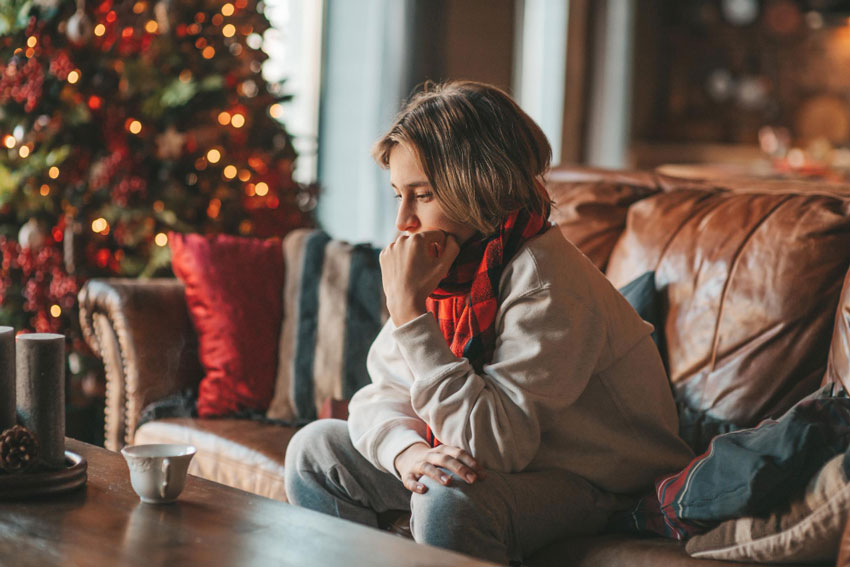In the build-up to the holiday season, it is normal to feel a sense of dread or anxiety. While it can often be mixed in with our other feelings of joy or excitement, it can also overshadow our ability to connect with those positive emotions. In this blog, we will explore the causes of holiday loneliness and how to cope—helping you reconnect with the holiday joy before your negative feelings continue to grow.
Causes of Holiday Loneliness
Two main factors can influence our mood changes around this time of year: seasonal changes and social pressure.
Seasonal changes, including shorter days and colder weather, can severely impact our mental health, both physiologically and emotionally. Less light exposure throws off our circadian rhythm, leading to imbalances in neurotransmitters like serotonin and melatonin. This causes depression symptoms including low energy, sleep issues, and sluggish metabolism. The physical effects of decreased light induce the experience of Seasonal Affective Disorder (SAD), a diagnosable condition, which amplifies the loneliness we feel when approaching the holiday season.
This loneliness is compounded when the cold days take away our traditional coping mechanisms like spending time outdoors, taking walks, or engaging in seasonal sports, as well as the consistent social interaction that often comes with the summer months.
Social pressure also contributes to our feeling of holiday loneliness. While our families often mean well, for many, the holidays are a time when certain family members cross boundaries, try to exert influence, or shame us for our choices. The connection we crave can become inaccessible when our actual experience clashes with our desire for loving bonds.
Holiday stress also adds to this disconnect. Our environment is pressurized by worries about cooking the perfect meal, buying the perfect gift, or behaving in the perfect way. This sustained stress causes increased cortisol in our system, leading to anxiety and depression.
Furthermore, we are surrounded by images of large, happy families or social groups whether we look at our phones, walk by advertisements, or turn on the TV. Societal images highlight what we already feel we’re missing, isolating us even more. This is particularly difficult if you are dealing with grief or the loss of a loved one.
How to Cope with Loneliness During the Holidays
This holiday season, remember these tips for improving your mental health and combatting physically depressive factors:
- Set Realistic Expectations: Remind yourself that most family gatherings don’t look like a Hallmark movie. Know what is realistic for your family, friends, and yourself, and don’t be afraid to turn down invitations that feel too overwhelming or demanding.
- Volunteer: Giving back to others can remind us what the holiday season is truly about, removing some superficial pressures. It can also occupy our time, give us a purpose, and motivate us to stick with our commitments.
- Set & Enforce Boundaries: You can’t control others, but you can control yourself. Identifying your boundaries is a crucial part of navigating the holidays, and communicating these boundaries lets your loved ones know when you’ve hit your limit.
- Stay Off Social Media: If you find you’re comparing yourself to that one girl from high school, that influencer on TikTok, or that ad you keep seeing between stories, then it might be time to step away. Minimize your triggers to take back control of your mood.
- Find a Community: Realizing you’re not alone is a powerful breakthrough in treating loneliness of any sort. Reach out to spiritual groups, grief groups, social circles, online forums, or any other community you resonate with.
- Keep Healthy Habits: Maintaining your routines and lifestyle, in spite of stress, can help increase your stability. Eat healthy, exercise indoors, or practice mindfulness. Explore new habits that might be helpful for you.
- Reach Out to Loved Ones: Your loved ones can’t help you if they’re unaware of your situation. If your holiday loneliness is coming from a place of stress, pressure, or withdrawal, let them help shoulder the burden.
- Stay Active & Engaged: Taking up hobbies, volunteering, socializing, working, etc. are all ways to occupy time and distract your brain from the unconscious feelings you’re experiencing.
Ketamine Treatment for Depression
Traditional depression treatments—like antidepressants or talk therapy—can take weeks or months to show results. But, ketamine therapy has emerged as a fast-acting and innovative option for people struggling with major depression, anxiety, and seasonal affective disorder, all symptoms of the holiday season. Ketamine targets glutamate receptors in the brain, creating new neural connections and resetting emotional patterns associated with depression. Many patients report relief within hours or days, rather than weeks or months.
During the holiday season, when emotional lows can feel especially intense, ketamine treatment for depression may help you regain clarity, motivation, and a sense of connection, offering a renewed sense of hope.
Contact JoyDeVie Infusions
If you are feeling the effects of seasonal depression or feel weighed down by the impending holiday stress, you are not alone. Follow our self-care tips and remember professional mental health support is available.

